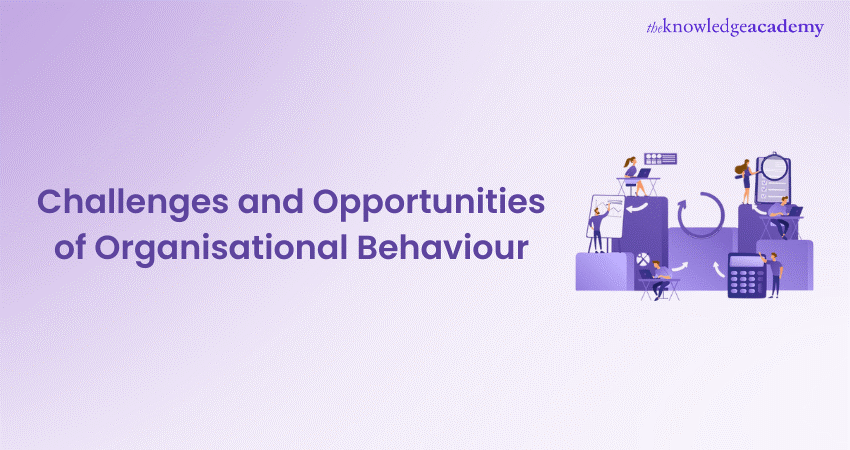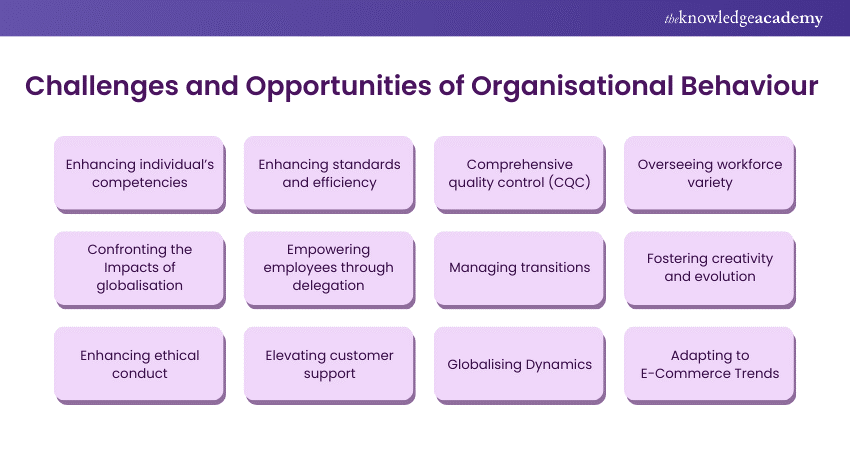We may not have the course you’re looking for. If you enquire or give us a call on + 1-866 272 8822 and speak to our training experts, we may still be able to help with your training requirements.
Training Outcomes Within Your Budget!
We ensure quality, budget-alignment, and timely delivery by our expert instructors.

Organisational behaviour can be likened to a complex puzzle, where each piece represents a unique challenge or opportunity. Just as assembling a puzzle requires careful observation, analysis, and strategic thinking, understanding organisational behaviour demands a similar approach.
The challenges within organisational behaviour involve navigating diverse personalities, managing conflicts, and adapting to changing dynamics. Conversely, the opportunities lie in fostering collaboration, enhancing productivity, and creating a harmonious work environment. By unravelling the puzzle of organisational behaviour, businesses can unlock their full potential and achieve remarkable success.
Table of contents
1) What is Organisational Behaviour?
2) Challenges and Opportunities of Organisational Behaviour
a) Enhancing individuals' competencies
b) Enhancing standards and efficiency
c) Comprehensive Quality Control (CQC)
d) Overseeing workforce variety
e) Confronting the impacts of globalisation
f) Empowering employees through delegation
g) Managing transitions
h) Fostering creativity and evolution
i) Enhancing ethical conduct
j) Elevating customer support
3) Conclusion
What is Organisational Behaviour?
Organisational Behaviour (OB) is a field of study that examines the individual, group, and structural aspects of organisations and their impact on behaviour within the workplace. It explores how individuals interact with each other, how groups form and function, and how organisational structures influence employee behaviour and performance. OB encompasses various disciplines, such as psychology, sociology, and management, aiming to understand and improve motivation, communication, leadership, decision-making, and organisational culture. The ultimate goal of organisational behaviour is to enhance organisational effectiveness and the well-being of individuals within the organisation.
Challenges and Opportunities of Organisational Behaviour

Navigating the department of Organisational Behaviour presents a duality of challenges and opportunities, influencing the dynamics and success of any enterprise. Let’s cover these challenges and opportunities one by one.
Enhancing individuals' competencies
Enhancing individuals' competencies refers to developing and improving employees' skills, knowledge, and abilities within an organisation. This involves providing training and professional development opportunities and fostering a culture of continuous learning. By investing in enhancing individuals' competencies, organisations can improve employee performance, job satisfaction, and overall productivity.
Opportunities:
1) Training and development programs can be designed to address specific skill gaps and promote employee growth.
2) Encouraging employees to pursue additional education and certifications can enhance their competencies.
3) Mentoring and coaching programs can provide guidance and support for individuals to develop new skills.
Enhancing standards and efficiency
Enhancing standards and efficiency involves the challenge of improving processes, systems, and workflows to achieve higher levels of productivity and effectiveness. This requires identifying and eliminating bottlenecks, streamlining operations, and implementing best practices. By enhancing standards and efficiency, organisations can optimise resource utilisation, reduce costs, and deliver better results.
Opportunities:
1) Implementing quality management systems such as Six Sigma or Lean methodologies can help identify and eliminate inefficiencies.
2) Embracing technology solutions and automation can streamline processes and improve efficiency.
3) Regular performance evaluations and feedback mechanisms can help identify areas for improvement and set higher standards.
Enhance your knowledge in in Architect roles with our Enterprise and Solution Architecture Course- sign up now!
Comprehensive Quality Control (CQC)
Comprehensive quality control refers to the challenge of ensuring that products, services, and processes meet or exceed customer expectations. It involves establishing quality standards, monitoring performance, and implementing corrective measures when necessary. By prioritising comprehensive quality control, organisations can enhance customer satisfaction, build a positive reputation, and gain a competitive advantage.
Opportunities:
1) Implementing quality assurance systems can help identify and prevent quality issues before they arise.
2) Conducting regular audits and inspections can ensure compliance with quality standards.
3) Encouraging a culture of continuous improvement can foster a proactive approach to quality control.
Overseeing workforce variety
Overseeing workforce variety involves managing the challenges and opportunities that arise from having a diverse workforce. It requires promoting inclusivity, managing cultural differences, and leveraging the unique perspectives and strengths of individuals from different backgrounds. By effectively overseeing workforce variety, organisations can foster innovation, creativity, and better decision-making.
Opportunities:
1) Implementing diversity and inclusion initiatives can create a positive and inclusive work environment.
2) Encouraging cross-cultural awareness and sensitivity training can help employees understand and appreciate different perspectives.
3) Leveraging diverse teams can lead to a broader range of ideas and solutions.
Confronting the impacts of globalisation
Confronting the impacts of globalisation refers to the challenge of operating in a globalised market and managing the opportunities and threats associated with it. This includes dealing with international competition, cultural diversity, and global supply chains. Organisations must adapt their strategies, processes, and structures to thrive in a globalised economy.
Opportunities:
1) Expanding operations to international markets can open new avenues for growth and revenue.
2) Collaborating with global partners and suppliers can enhance competitiveness and access to resources.
3) Developing a global mindset and cultural intelligence can help navigate diverse markets and customer preferences.
Learn the concept of Business Change with our Business Change Course join today!
Empowering employees through delegation
Empowering employees through delegation involves the challenge of entrusting decision-making authority and responsibility to employees at various levels. This requires creating a supportive and empowering work environment, clarifying expectations, and providing employees with the necessary resources and autonomy to make decisions. By empowering employees through delegation, organisations can foster innovation, improve employee engagement, and enhance organisational agility.
Opportunities:
1) Delegating authority can free up managers' time to focus on strategic initiatives.
2) Empowering employees can foster a sense of ownership and accountability.
3) Encouraging employee involvement in decision-making can lead to diverse perspectives and better problem-solving.
Managing transitions
Managing transitions refers to the challenge of effectively leading and supporting employees through organisational changes such as mergers, acquisitions, restructuring, or technological advancements. It involves minimising resistance to change, facilitating communication, and providing support during periods of uncertainty. By managing transitions effectively, organisations can minimise disruptions, maintain employee morale, and facilitate successful change implementation.
Opportunities:
1) Developing change management strategies and plans can provide a structured approach to navigate transitions.
2) Communicating openly and transparently about changes can help alleviate employee concerns and build trust.
3) Offering training and support to employees can facilitate their adaptation to new roles and responsibilities.
Fostering creativity and evolution
Fostering creativity and evolution involves creating an environment that encourages innovation, experimentation, and continuous improvement. It requires promoting a culture of creativity, providing resources for exploration, and rewarding innovative thinking. By fostering creativity and evolution, organisations can stay ahead of the competition, drive innovation, and adapt to changing market dynamics.
Opportunities:
1) Encouraging brainstorming sessions and idea-sharing platforms can stimulate creativity and innovation.
2) Allocating resources for research and development can support the exploration of new ideas and technologies.
3) Recognising and rewarding innovative efforts can motivate employees to think outside the box.
Enhancing ethical conduct
Enhancing ethical conduct involves the challenge of promoting ethical behaviour and decision-making within an organisation. It requires establishing a strong ethical framework, providing ethics training, and fostering a culture of integrity and accountability. By enhancing ethical conduct, organisations can build trust with stakeholders, maintain a positive reputation, and mitigate legal and ethical risks.
Opportunities:
1) Developing a comprehensive code of ethics and conduct can provide clear guidelines for employees.
2) Conducting ethics training and workshops can raise awareness and promote ethical decision-making.
3) Encouraging open communication channels can empower employees to report unethical behaviour.
Elevating customer support
Elevating customer support involves the challenge of delivering exceptional customer service and building strong customer relationships. It requires understanding customer needs, providing timely and personalised assistance, and continuously improving the customer experience. By elevating customer support, organisations can enhance customer loyalty, increase customer satisfaction, and drive business growth.
Opportunities:
1) Implementing customer relationship management (CRM) systems can help track customer interactions and preferences.
2) Training customer support teams on effective communication and problem-solving can improve customer service skills.
3) Gathering customer feedback and implementing improvements based on their suggestions can enhance the customer experience.
Globalising Dynamics
Globalising dynamics refer to the challenge of operating in a globalised business environment and adapting to international trends and market shifts. It involves staying updated on global economic, political, and technological developments, and adjusting business strategies accordingly. By understanding and responding to globalising dynamics, organisations can seize international opportunities and mitigate potential threats.
Opportunities:
1) Conducting market research and analysis can provide insights into global trends and customer preferences.
2) Building strategic partnerships and alliances with international organisations can expand market reach.
3) Investing in technology and infrastructure to support global operations can increase competitiveness.
Adapting to E-Commerce Trends
Adapting to e-commerce trends involves the challenge of leveraging digital technologies and online platforms to meet customer demands and stay competitive in the digital marketplace. It requires developing robust e-commerce strategies, optimising online user experiences, and integrating digital channels with traditional business models. By adapting to e-commerce trends, organisations can reach a wider customer base, improve operational efficiency, and drive online sales growth.
Opportunities:
1) Building a user-friendly and secure e-commerce website or mobile app can enhance the customer experience.
2) Implementing data analytics and artificial intelligence tools can provide insights for personalised marketing and product recommendations.
3) Embracing digital marketing strategies such as social media marketing and search engine optimisation can increase online visibility and brand awareness.
Conclusion
Organisational behaviour presents a dynamic view of challenges and opportunities for businesses. By navigating issues such as workforce diversity, globalisation impacts, and ethical conduct, organisations can unlock potential for innovation, efficiency, and customer satisfaction. Embracing these opportunities fosters growth, resilience, and success in today's ever-evolving business environment.
Gain in-depth knowledge of the objectives of governance with our Organisational Behaviour Course!
Frequently Asked Questions

Opportunity types in organisational behaviour include advancement opportunities, learning and development opportunities, leadership opportunities, and networking opportunities.

Opportunities are important because they allow individuals to grow, learn, and advance within their organisation. They foster personal and professional development, enable skill enhancement, and contribute to overall career satisfaction and success.

The Knowledge Academy takes global learning to new heights, offering over 30,000 online courses across 490+ locations in 220 countries. This expansive reach ensures accessibility and convenience for learners worldwide.
Alongside our diverse Online Course Catalogue, encompassing 17 major categories, we go the extra mile by providing a plethora of free educational Online Resources like News updates, Blogs, videos, webinars, and interview questions. Tailoring learning experiences further, professionals can maximise value with customisable Course Bundles of TKA.

The Knowledge Academy’s Knowledge Pass, a prepaid voucher, adds another layer of flexibility, allowing course bookings over a 12-month period. Join us on a journey where education knows no bounds.

The Knowledge Academy offers various Organisational Behaviour including Business Analysis Course, Enterprise and Solution Architecture Course, Project Management Course and Agile Course. These courses cater to different skill levels, providing comprehensive insights into BCS Code of Conduct
Our Business Analysis Blogs covers a range of topics related to Scrum, offering valuable resources, best practices, and industry insights. Whether you are a beginner or looking to advance your Business Improvement skills, The Knowledge Academy's diverse courses and informative blogs have you covered.
Upcoming Business Analysis Resources Batches & Dates
Date
 BCS Foundation Certificate in Architecture Concepts and Domains
BCS Foundation Certificate in Architecture Concepts and Domains
Mon 23rd Sep 2024
Tue 12th Nov 2024









 Top Rated Course
Top Rated Course



 If you wish to make any changes to your course, please
If you wish to make any changes to your course, please


